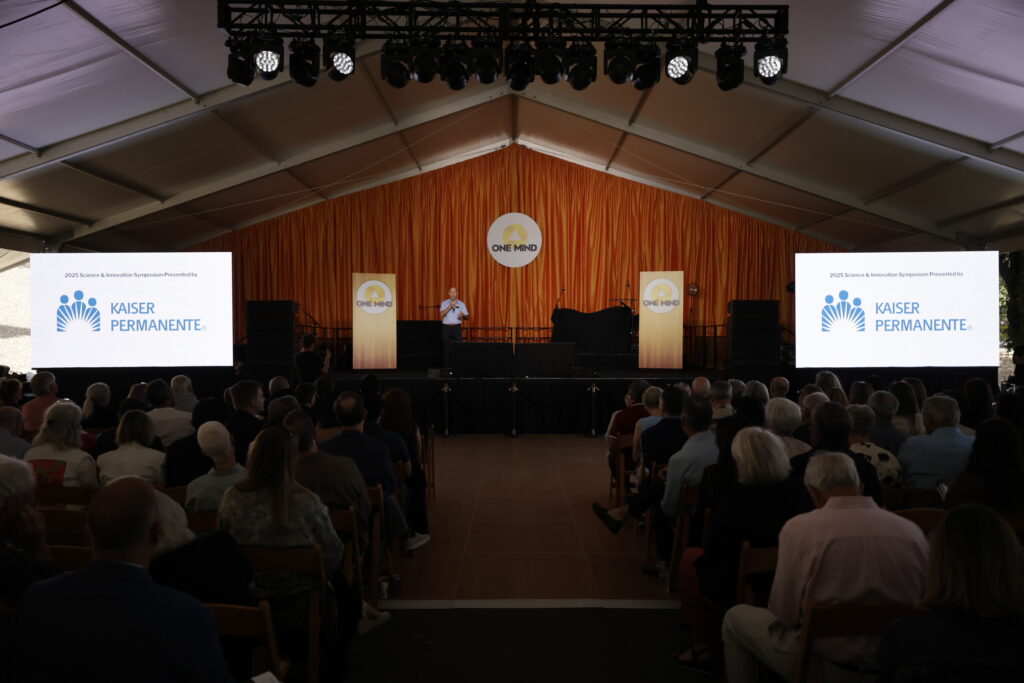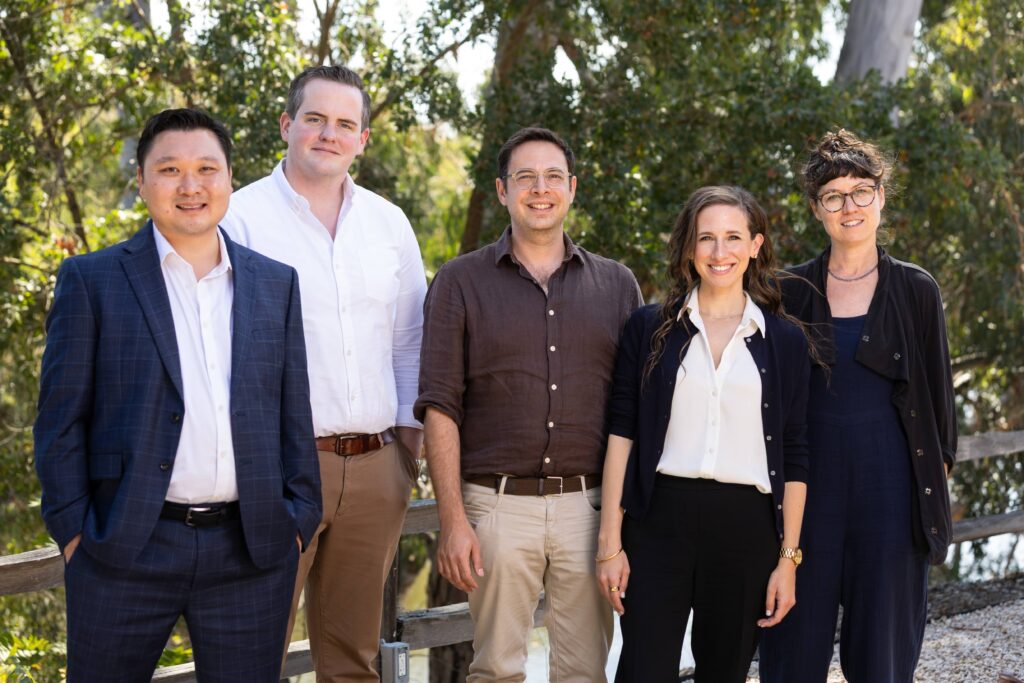Watch the Inspiring 2025 Science & Innovation Symposium Talks, Presented at the 31st One Mind Music Festival

The annual One Mind Music Festival began once again with the Science & Innovation Symposium, a dynamic forum that highlights new frontiers in the diagnosis, prevention, and treatment of mental health conditions. On September 13, 2025, the 31st One Mind Music Festival—presented by Bank of America and Bristol Myers Squibb—welcomed more than 450 dedicated supporters to the beautiful Staglin Family Vineyard. Together, attendees helped generate a record-breaking $4.1 million to advance mental health research and brain science initiatives.
This year’s symposium, made possible with generous support by Kaiser Permanente, featured an inspiring lineup of thought leaders and innovators, including One Mind Accelerator founders, 2025 One Mind Rising Star Award recipients (pictured below), and leaders from One Mind at Work and the One Mind Lived Experience Initiative, all sharing transformative research and insights.

Be part of the energy and momentum—dive into these powerful presentations and connect with the movement shaping the future of mental health. Subscribe to One Mind’s YouTube channel to catch all the newest content, events, and updates.
2025 Keynote
In this deeply moving keynote presentation, Regina Dugan, PhD, CEO of Wellcome Leap, and Susanne Ahmari, MD, PhD, Program Director at Wellcome Leap, Associate Professor of Psychiatry at the University of Pittsburgh School of Medicine, and 2018 One Mind Rising Star Awardee, share a talk titled “Somebody’s Rachel: Delivering Innovation with Impact.”
Drawing from the heartbreaking story of Dugan’s daughter, Rachel, who was lost to depression at just 18, this presentation sheds light on the urgent need for breakthroughs in mental health care. Together, they unveil the progress of Wellcome Leap’s Multi-Channel Psych (MC Psych) program, a bold $50 million initiative designed to transform the treatment of depression.
With compassion and scientific rigor, Dugan and Ahmari illustrate how precision psychiatry—powered by AI, predictive algorithms, and purpose-built data—can dramatically shorten the time it takes to find the right treatment for patients with depression. What once could take 252 days of trial and error may now be reduced to just 91 days, potentially saving lives and eliminating months of suffering.
This is more than a scientific achievement—it’s a mission of hope. For Rachel. For somebody’s Rachel. And for the millions of people worldwide living with depression who need breakthroughs faster.
2025 One Mind Rising Star Awards: Research Presentations
2025 One Mind-Burroughs Wellcome Fund Rising Star Awardee, Neir Eshel, MD, PhD, is rewiring the brain’s effort and motivation circuits to turn exhaustion into energy—offering fresh treatment paths for depression.
Everyday tasks can feel exhausting for people with depression, even when they previously enjoyed challenging activities. Dr. Eshel’s research examines how the brain assigns value to effort and why this system can fail in depression. His lab discovered that dopamine release in the nucleus accumbens increases with effort expenditure—regardless of reward—producing a “sunk cost” signal that helps sustain motivation. This project will map the brain circuits generating and responding to this effort signal, focusing on how dopamine, acetylcholine, and two major types of striatal neurons work together to drive persistence. Using mouse models of depression in which chronic stress reduces motivation, his team will investigate how these circuits are altered and test strategies to restore healthy effort signaling. The findings could guide the development of medications or brain stimulation approaches that transform effort from depleting to energizing, offering new hope for individuals struggling with depression.
2025 One Mind Accelerator Talks
Co-Founded by CEO Dina Burkitbayeva, and John Krystal, MD, Freedom Biosciences is a Yale spin-out and clinical-stage biotech platform developing next generation neuropsychiatric combination drugs. The pipeline includes two programs expected to enter the clinic this year: (1) The lead program Free001 (“extended efficacy ketamine”) is expected to start Phase 2a in H2 2025 for Treatment Resistant Depression (TRD) and (2) Free008 (“non-hallucinogenic psilocybin”) is expected to start Phase 1 in mid 2025 in the UK. The lead program (Free001 “extended efficacy” ketamine) is based on a Yale study that showed 3-4x longer duration of antidepressant effect than ketamine & esketamine: 14-21 days in antidepressant effects vs. 2-7 days for racemic ketamine and esketamine (published in Nature). Free001 is positioned to build upon the success of Jannsen’s Esketamine SPRAVATO, with $1B+ annual sales (expected to hit $5B).
The company has a stellar team: Co-Founder, Dr. John Krystal is Chair of Psychiatry at Yale. Dr. Krystal’s work at Yale led to the development of Jannsen’s Esketamine SPRAVATO, which was approved in 2019 for Treatment Resistant Depression. Co-Founder and CEO, Dina Burkitbayeva, is the Founder of PsyMed Ventures, a frontier mental health venture fund, and previously worked at McKinsey and J.P. Morgan. CMO, Dr. David Hough, led the SPRAVATO program ($1 Billion annual sales) for 7 years from Phase 2 through commercializa- tion and also led INVEGA SUSTENNA / INVEGA TRINZA programs ($4B+ annual sales). Chief Medical Advisor and Head of SAB, Dr. Robert Berman is the Co-Founder and former CMO of Biohaven (acquired by Pfizer for $11.6B in 2022).
Co-Founded by CEO Don Vaughn, PhD, and Jonathan Downar, MD, PhD, Ampa is a health tech startup that is commercializing a way to powerfully treat depression, anxiety, and addiction using technology—rather than meds. Ampa’s noninvasive device uses focused magnetic fields (TMS) to reactivate brain networks that have been disabled by mental illness. Data across multiple clinical sites show that 70% of patients achieve remission from depression after a one-day treatment. This efficacy, speed, and lack of side effects are unmatched. Ampa has developed unique technology to commercialize TMS at scale and democratize access for the other 99% who can’t afford or access this treatment.
Ampa’s vision is to meaningfully reduce the incidence and burden of depression by democratizing access to the most effective treatment. Towards this end, Ampa is commercializing technology that enables less expensive, smaller, and simpler TMS therapy while maintaining the high standard of efficacy set by the SNT protocol. The Ampa TMS platform is simple, scalable, portable, and telemedicine-capable—a next-generation TMS delivery system that enables patients to access high-quality, state-of-the-art treatment in any environment. With its focus on scalability and innovation, Ampa is poised to redefine the future of mental health care, offering renewed hope to millions worldwide.
2025 Fireside Chat
In this candid conversation, One Mind CEO Kathleen Pike, PhD and Alex Sheehan, One Mind Lived Experience Council member, explore how workplaces can be catalysts for hope, healing, and human potential. Grounded in the latest science from One Mind’s Mental Health at Work Index, this conversation shares employer strategies for protecting mental health, promoting well-being, and providing resources that empower employees, including those living with serious mental illness, to thrive. Weaving together data-driven insights, best practice guidance, and lived experience, this conversation illuminates how creating supportive workplaces strengthens not only individuals, but the organizations and communities we share.
Thank you to everyone who made the 30th One Mind Music Festival and the Science & Innovation Symposium a huge success! Your support enriches our research community, and we look forward to seeing you at next year’s event on September 19, 2026.
